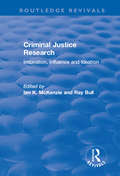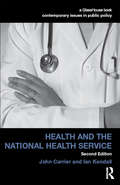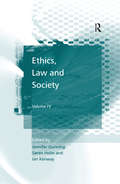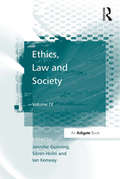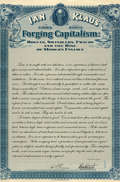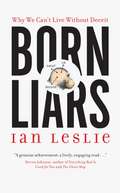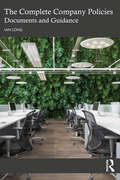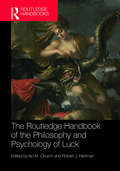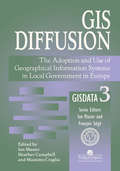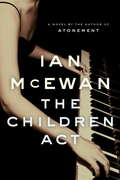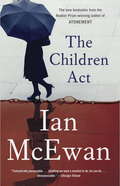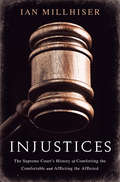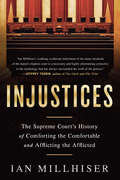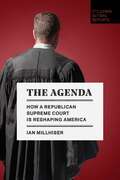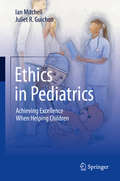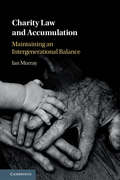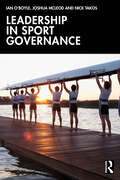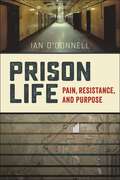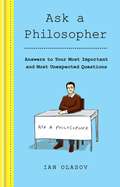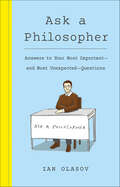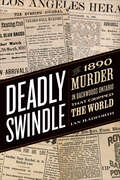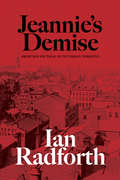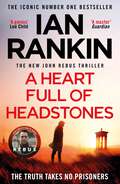- Table View
- List View
Criminal Justice Research: Inspiration Influence and Ideation (Routledge Revivals)
by Ray Bull Ian K McKenzieThis title was first published in 2002: A collection of criminal justice researchers select a number of books, documents, papers and such like, that they believe to be important and influential in the field of criminal justice research. Each author has written a description and critique of the selected item and have discussed the impact of each of them with regards to formulating or developing their own research. The authors also speculate onb the direction they believe the area in question might be expected to develop in the first 10-15 years of the 21st century. The definition of crimnal justice, in this book, is a broad one, and that is reflected in the combination of criminologists, psychologists, sociologists and experts on social and public administration. In all the book attempts to examine the inspirations, influences and thought processes which underpin criminal justice research efforts.
Health and the National Health Service (Contemporary Issues in Public Policy)
by John Carrier Ian KendallThe NHS came into existence in an atmosphere of conflict centred on the strong ideological commitment of the Post-war Labour Government and the opposition of the Conservative Party of that time to the idea of a universally available and centrally planned medical care service. There was also opposition from some sections of the medical establishment who feared the loss of professional autonomy. Setting health policy in both an historical and modern context (post 1997) Carrier and Kendall weigh up the successes and failures of the National Health Service and examine the conflicts which have continued for over sixty years, in spite of efforts to solve financial problems in the NHS through increases in funding as well as structural and organisational change. After looking at recent responses to supposed failures of the NHS, they conclude that the NHS has successfully faced the challenges before it and is likely to continue to meet the changing health needs of the population. Financial stresses, concerns about the quality of care and demographic change, with consequent issues for the elderly and the chronically ill, continue to be urgent and politically contentious issues. This book is appropriate for a wide range of undergraduate and postgraduate students studying health policy and the NHS.
Ethics, Law and Society: Volume IV
by Søren Holm Jennifer Gunning Ian KenwayThis key collection brings together a selection of papers commissioned and published by the Cardiff Centre for Ethics, Law & Society. It incorporates contributions from a group of international experts along with a selection of short opinion pieces written in response to specific ethical issues. The collection addresses issues arising in biomedical and medical ethics ranging from assisted reproductive technologies to the role of clinical ethics committees. It examines broader societal issues with particular emphasis on sustainability and the environment and also focuses on issues of human rights in current global contexts. The contributors collect responses to issues arising from high profile cases such as the legitimacy of war in Iraq to physician-related suicide. The volume will provide a valuable resource for practitioners and academics with an interest in ethics across a range of disciplines.
Ethics, Law and Society: Volume IV
by Søren Holm Jennifer Gunning Ian KenwayThis key collection brings together a selection of papers commissioned and published by the Cardiff Centre for Ethics, Law & Society. It incorporates contributions from a group of international experts along with a selection of short opinion pieces written in response to specific ethical issues. The collection addresses issues arising in biomedical and medical ethics ranging from assisted reproductive technologies to the role of clinical ethics committees. It examines broader societal issues with particular emphasis on sustainability and the environment and also focuses on issues of human rights in current global contexts. The contributors collect responses to issues arising from high profile cases such as the legitimacy of war in Iraq to physician-related suicide. The volume will provide a valuable resource for practitioners and academics with an interest in ethics across a range of disciplines.
Forging Capitalism
by Ian KlausVice is endemic to Western capitalism, according to this fascinating, wildly entertaining, often startling history of modern finance. Ian Klaus's Forging Capitalism demonstrates how international financial affairs in the nineteenth century were conducted not only by gentlemen as a noble pursuit but also by connivers, thieves, swindlers, and frauds who believed that no risk was too great and no scheme too outrageous if the monetary reward was substantial enough. Taken together, the grand deceptions of the ambitious schemers and the determined efforts to guard against them have been instrumental in creating the financial establishments of today. In a story teeming with playboys and scoundrels and rich in colorful and amazing events, Klaus chronicles the evolution of trust through three distinct epochs: the age of values, the age of networks and reputations, and, ultimately, in a world of increased technology and wealth, the age of skepticism and verification. In today's world, where the questionable dealings of large international financial institutions are continually in the spotlight, this extraordinary history has great relevance, offering essential lessons in both the importance and the limitations of trust.
Born Liars: Why We Can't Live Without Deceit
by Ian LeslieLying is an intrinsic part of our social fabric, but it is also a deeply problematic and misunderstood aspect of what makes us human. Ian Leslie takes us on a fascinating journey that makes us question not only our own relationship to the truth, but also virtually every daily encounter we have. On the way he dissects the history of the lie detector, how parents affect their children’s attitude to lying (and vice versa), Who Wants to Be a Millionaire?, the philosophical ambiguity of telling the truth, Bill Clinton’s presentational prowess, Wonder Woman’s lasso of truth, and why we should be wary of anyone with more than 150 Facebook friends. Born Liars is thought-provoking, anecdotally driven narrative nonfiction at its best. Ian Leslie’s intoxicating blend of anthropology, biology, cultural history, philosophy, and popular psychology belies a serious central message: that humans have evolved and thrived in large part because of their ability to deceive.
The Complete Company Policies: Documents and Guidance
by Ian LongThis book is about a much neglected but essential element of the success of any business: company policy. This is a comprehensive guide to determining what policies your company needs, and how to draft and approve the relevant documents and implement them throughout the organization. From anti-bribery laws to data privacy and health and safety, your business is faced with a range of legal and regulatory obligations that must be identified and documented properly. These obligations must be addressed for internal and external stakeholders. The task of identifying and documenting effective policies is an essential step in establishing good corporate governance and ultimately a culture of compliance. These policies in turn provide a solid foundation for the reputation and commercial success of the organization, and form an essential "bridge" between the company’s strategy and the various procedures needed to carry it out. With many useful templates and practical examples, this book will help you to ensure the accuracy and completeness of your policy documents. It covers all areas of your business, including financial reporting, anti-money laundering, anti-fraud, conflicts of interest, data privacy and security, remote working, social media, whistleblowing, and more.This book will be useful to company directors, company secretaries and senior managers, and their advisers, including consultants, auditors, and solicitors. It will be particularly relevant to any business that needs to create or review their policies in light of current regulations and standards.
The Routledge Handbook of the Philosophy and Psychology of Luck (Routledge Handbooks in Philosophy)
by Ian M. Church Robert J. HartmanLuck permeates our lives, and this raises a number of pressing questions: What is luck? When we attribute luck to people, circumstances, or events, what are we attributing? Do we have any obligations to mitigate the harms done to people who are less fortunate? And to what extent is deserving praise or blame affected by good or bad luck? Although acquiring a true belief by an uneducated guess involves a kind of luck that precludes knowledge, does all luck undermine knowledge? The academic literature has seen growing, interdisciplinary interest in luck, and this volume brings together and explains the most important areas of this research. It consists of 39 newly commissioned chapters, written by an internationally acclaimed team of philosophers and psychologists, for a readership of students and researchers. Its coverage is divided into six sections: I: The History of Luck II: The Nature of Luck III: Moral Luck IV: Epistemic Luck V: The Psychology of Luck VI: Future Research. The chapters cover a wide range of topics, from the problem of moral luck, to anti-luck epistemology, to the relationship between luck attributions and cognitive biases, to meta-questions regarding the nature of luck itself, to a range of other theoretical and empirical questions. By bringing this research together, the Handbook serves as both a touchstone for understanding the relevant issues and a first port of call for future research on luck.
GIS Diffusion: The Adoption And Use Of Geographical Information Systems In Local Government in Europe
by Ian Masser; Heather Campbell; Massimo CragliaThis third book in the GISDATA series focuses on the widespread use of geographical information systems GIS in European local government. The editors include a wide range of applications carried out by different professional groups, and offer the opportunity of studying the extent to which diffusion of innovations like GIS are sensitive to national issues such as cultural context, institutional setup and the availability of data.; The book answers key questions such as: what can be learnt from research on organizational behaviour in relation to technological innovation?; what are the classical features of the GIS diffusion process?; to what extent is the adoption and utilization of GIS facilitated - or impeded - by the organizational culture within which it takes place?; and what mechanisms can be applied to enhance the diffusion of GIS? The book covers aspects of diffusion in the following European countries: UK, France, Italy, Poland, Denmark, The Netherlands, Germany, Greece and Portugal.
The Children Act
by Ian McewanA brilliant, emotionally wrenching new novel from the author of Atonement and Amsterdam. Fiona Maye is a High Court judge in London presiding over cases in family court. She is fiercely intelligent, well respected, and deeply immersed in the nuances of her particular field of law. Often the outcome of a case seems simple from the outside, the course of action to ensure a child's welfare obvious. But the law requires more rigor than mere pragmatism, and Fiona is expert in considering the sensitivities of culture and religion when handing down her verdicts. But Fiona's professional success belies domestic strife. Her husband, Jack, asks her to consider an open marriage and, after an argument, moves out of their house. His departure leaves her adrift, wondering whether it was not love she had lost so much as a modern form of respectability; whether it was not contempt and ostracism she really fears. She decides to throw herself into her work, especially a complex case involving a seventeen-year-old boy whose parents will not permit a lifesaving blood transfusion because it conflicts with their beliefs as Jehovah's Witnesses. But Jack doesn't leave her thoughts, and the pressure to resolve the case--as well as her crumbling marriage--tests Fiona in ways that will keep readers thoroughly enthralled until the last stunning page.
The Children Act
by Ian McewanFiona Maye is a leading High Court judge who presides over cases in the family court. She is renowned for her fierce intelligence, exactitude, and sensitivity. But her professional success belies private sorrow and domestic strife. There is the lingering regret of her childlessness, and now her marriage of thirty years is in crisis.At the same time, she is called on to try an urgent case: Adam, a beautiful seventeen-year-old boy, is refusing for religious reasons the medical treatment that could save his life, and his devout parents echo his wishes. Time is running out. Should the secular court overrule sincerely expressed faith? In the course of reaching a decision, Fiona visits Adam in the hospital--an encounter that stirs long-buried feelings in her and powerful new emotions in the boy. Her judgment has momentous consequences for them both.parents will not permit a lifesaving blood transfusion because it conflicts with their beliefs as Jehovah's Witnesses. But Jack doesn't leave her thoughts, and the pressure to resolve the case--as well as her crumbling marriage--tests Fiona in ways that will keep readers thoroughly enthralled until the last stunning page.
Injustices
by Ian MillhiserFew American institutions have inflicted greater suffering on ordinary people than the Supreme Court of the United States. Since its inception, the justices of the Supreme Court have shaped a nation where children toiled in coal mines, where Americans could be forced into camps because of their race, and where a woman could be sterilized against her will by state law. The Court was the midwife of Jim Crow, the right hand of union busters, and the dead hand of the Confederacy. Nor is the modern Court a vast improvement, with its incursions on voting rights and its willingness to place elections for sale. In this powerful indictment of a venerated institution, Ian Millhiser tells the history of the Supreme Court through the eyes of the everyday people who have suffered the most from it. America ratified three constitutional amendments to provide equal rights to freed slaves, but the justices spent thirty years largely dismantling these amendments. Then they spent the next forty years rewriting them into a shield for the wealthy and the powerful. In the Warren era and the few years following it, progressive justices restored the Constitution’s promises of equality, free speech, and fair justice for the accused. But, Millhiser contends, that was an historic accident. Indeed, if it weren’t for several unpredictable events, Brown v. Board of Education could have gone the other way. In Injustices, Millhiser argues that the Supreme Court has seized power for itself that rightfully belongs to the people’s elected representatives, and has bent the arc of American history away from justice.
Injustices
by Ian MillhiserFew American institutions have inflicted greater suffering on ordinary people than the Supreme Court of the United States. Since its inception, the justices of the Supreme Court have shaped a nation where children toiled in coal mines, where Americans could be forced into camps because of their race, and where a woman could be sterilized against her will by state law. The Court was the midwife of Jim Crow, the right hand of union busters, and the dead hand of the Confederacy. Nor is the modern Court a vast improvement, with its incursions on voting rights and its willingness to place elections for sale. In this powerful indictment of a venerated institution, Ian Millhiser tells the history of the Supreme Court through the eyes of the everyday people who have suffered the most from it. America ratified three constitutional amendments to provide equal rights to freed slaves, but the justices spent thirty years largely dismantling these amendments. Then they spent the next forty years rewriting them into a shield for the wealthy and the powerful. In the Warren era and the few years following it, progressive justices restored the Constitution’s promises of equality, free speech, and fair justice for the accused. But, Millhiser contends, that was an historic accident. Indeed, if it weren’t for several unpredictable events, Brown v. Board of Education could have gone the other way. In Injustices, Millhiser argues that the Supreme Court has seized power for itself that rightfully belongs to the people’s elected representatives, and has bent the arc of American history away from justice.
Injustices: The Supreme Court's History of Comforting the Comfortable and Afflicting the Afflicted
by Ian MillhiserNow with a new epilogue.Few American institutions have inflicted greater suffering on ordinary people than the Supreme Court of the United States. Since its inception, the justices of the Supreme Court have shaped a nation where children toiled in coal mines, where Americans could be forced into camps because of their race, and where a woman could be sterilized against her will by state law. The Court was the midwife of Jim Crow, the right hand of union busters, and the dead hand of the Confederacy. Nor is the modern Court a vast improvement, with its incursions on voting rights and its willingness to place elections for sale.In this powerful indictment of a venerated institution, Ian Millhiser tells the history of the Supreme Court through the eyes of the everyday people who have suffered the most from it. America ratified three constitutional amendments to provide equal rights to freed slaves, but the justices spent thirty years largely dismantling these amendments. Then they spent the next forty years rewriting them into a shield for the wealthy and the powerful. In the Warren era and the few years following it, progressive justices restored the Constitution's promises of equality, free speech, and fair justice for the accused. But, Millhiser contends, that was an historic accident. Indeed, if it weren't for several unpredictable events, Brown v. Board of Education could have gone the other way.In Injustices, Millhiser argues that the Supreme Court has seized power for itself that rightfully belongs to the people's elected representatives, and has bent the arc of American history away from justice.
The Agenda: How a Republican Supreme Court is Reshaping America
by Ian MillhiserWHAT WILL A CONSERVATIVE SUPREME COURT DO WITH ITS POWER? From 2011, when Republicans gained control of the House of Representatives, until the present, Congress enacted hardly any major legislation outside of the tax law President Trump signed in 2017. In the same period, the Supreme Court dismantled much of America's campaign finance law, severely weakened the Voting Rights Act, permitted states to opt-out of the Affordable Care Act's Medicaid expansion, eroded laws protecting against age discrimination and sexual and racial harassment, and held that every state must permit same-sex couples to marry. This powerful unelected body, now controlled by six very conservative Republicans, has and will become the locus of policymaking in the U.S. Ian Millhiser, Vox's Supreme Court correspondent, tells the story of what those six justices are likely to do with their power. It is true that the right to abortion is in its final days, as is affirmative action. But Millhiser shows that it is in the most arcane decisions that the Court will fundamentally reshape America, transforming it into something far less democratic, by attacking voting rights, stripping power from agencies like the Environmental Protection Agency and the Department of Labor, granting vast legal exemptions to religious conservatives, and putting corporations above the law. The Agenda exposes a radically altered Supreme Court whose powers extend far beyond transforming any individual right--its agenda is to shape the very nature of America's government, redefining who gets to have legal rights, who is beyond the reach of the law, and who chooses the people who make our laws. IAN MILLHISER is a senior correspondent at Vox, where he focuses on the Supreme Court. Formerly he was a columnist at ThinkProgress. He is the author of Injustices: The Supreme Court's History of Comforting the Comfortable and Afflicting the Afflicted, and his writings have appeared in the New York Times, the Guardian, and the Yale Law & Policy Review. He received his J.D. from Duke University and clerked for Judge Eric L. Clay of the Sixth Circuit.
Ethics in Pediatrics: Achieving Excellence When Helping Children
by Ian Mitchell Juliet R. GuichonThis book offers easy access to the everyday ethics problems that occur in the medical care of children. It contains practical guidance on how physicians and other healthcare practitioners may manage both straightforward and complex ethics problems. The book provides a readable and comprehensive introduction to ethics issues for beginners and is also extremely valuable to experienced practitioners.This work covers important "classical" ethical issues such as privacy, confidentiality, truth telling, and discusses the elements of the relationships that might exist between parents and healthcare providers. However, the book also provides a resource for new and emerging areas of bioethics. These include issues arising in the new population of children who are beginning to survive the neonatal and infant periods with a multitude of problems – “children with medical complexity". Finally, it also includes a section on the advantages and pitfalls of social media use.
Charity Law and Accumulation: Maintaining an Intergenerational Balance
by Ian MurrayMuch has been written in charity law on the type of benefits that charities can provide - charitable purposes - and towards whom such benefits must be directed - the public benefit question. Almost nothing has been written about when benefits must be provided. However, accumulation of assets by charities raises profound ethical, economic and social considerations that are highlighted by the present retreat of the welfare state and the impact of the Global Financial Crisis and COVID-19. This book analyses the issue through a normative, doctrinal and comparative analysis of the legal constraints upon accumulation by charities. It reveals that the legal restraints contain significant gaps in relation to the intergenerational distribution of benefits and to the balance of decision-making between generations. In particular, the book asserts that there is room for law reform to better identify and incorporate principles of intergenerational justice into the regulation of charities.
Leadership in Sport Governance
by Ian O'Boyle Joshua McLeod Nick TakosThis is a concise introduction to leadership and governance theory and how they are applied in sport. Presenting a series of case studies from around the world, the book offers a detailed guide to best practice in the leadership of sport boards and organisations. Drawing on cutting-edge research, the book sets out the core concepts and principles of good leadership and good governance, explaining their importance in an era in which sport organisations have become increasingly bound by legal frameworks and subject to greater calls for accountability from wider society. The book analyses the key issues related to leadership in sport governance, including leadership styles with a focus on authentic leadership; intra-group dynamics; managing conflict and trust; leading in multi-layered networks; strategic leadership; and diversity, equity, and inclusion (DEI); and it considers the differing requirements of sport leadership in different geographical locations, under varying challenges and pressures. Full of illuminating cases, data and examples, this is an invaluable reading for any course in sport business and management and a useful primer for any sport business professional looking to improve their professional knowledge.
Prison Life: Pain, Resistance, and Purpose
by Ian O'DonnellHow prisons around the world shape the social lives of their inhabitantsPrison Life offers a fresh appreciation of how people in prison organize their lives, drawing on case studies from Africa, Europe and the US. The book describes how order is maintained, how power is exercised, how days are spent, and how meaning is found in a variety of environments that all have the same function – incarceration – but discharge it very differently. It is based on an unusually diverse range of sources including photographs, drawings, court cases, official reports, memoirs, and site visits.Ian O’Donnell contrasts the soul-destroying isolation of the federal supermax in Florence, Colorado with the crowded conviviality of an Ethiopian prison where men and women cook their own meals, seek opportunities to generate an income, elect a leadership team, and live according to a code of conduct that they devised and enforce. He explores life on wings controlled by the Irish Republican Army in Northern Ireland’s H Blocks, where men who saw the actions that led to their incarceration as politically-motivated moved as one, in perpetual defiance of the authorities. He shows how prisoners in Texas took to the courts to overthrow a regime that allowed their routine subjugation by violent men known as building tenders, who had been selected by staff to supervise and discipline their peers.In each case study O’Donnell presents the life story of a man who was molded by, and in return molded, the institution that held him. This ensures that his reflections on law and policy as well as on theory and practice never lose sight of the human angle. Imprisonment is about pain after all, and pain is personal.
Ask a Philosopher: Answers to Your Most Important – and Most Unexpected – Questions
by Ian OlasovThe perfect gift for the smart thinker in your life.For several years Ian Olasov has set up 'Ask-a-Philosopher' booths around New York City, answering questions from passersby. Now in this book he offers answers to the real-life questions on people's minds.From the philosophical to the frivolous, questions include:- Are people innately good or bad?- Is it okay to have a pet fish?- Is it okay to have kids?- Is colour subjective?- If humans colonise Mars, who will own the land?- Is ketchup a smoothie?- Is there life after death?- Should I give money to homeless people?Every question is approached from a philosophical standpoint, but the answer is made fun and accessible for everyone. One of the many joys of this book is that you see how philosophy can be both perfectly continuous with everyday life and also utterly transporting.
Ask a Philosopher: Answers to Your Most Important—and Most Unexpected—Questions
by Ian OlasovA collection of answers to the philosophical questions on people's minds—from the big to the personal to the ones you didn't know you needed answered.Based on real-life questions from his Ask a Philosopher series, Ian Olasov offers his answers to questions such as:- Are people innately good or bad?- Is it okay to have a pet fish?- Is it okay to have kids?- Is color subjective?- If humans colonize Mars, who will own the land?- Is ketchup a smoothie?- Is there life after death?- Should I give money to homeless people?Ask a Philosopher shows that there's a way of making philosophy work for each of us, and that philosophy can be both perfectly continuous with everyday life, and also utterly transporting. From questions that we all wrestle with in private to questions that you never thought to ask, Ask a Philosopher will get you thinking.
Deadly Swindle: An 1890 Murder in Backwoods Ontario that Gripped the World (Osgoode Society for Canadian Legal History)
by Ian RadforthIn February 1890, in a remote swamp in rural southwestern Ontario, two woodsmen discovered the frozen body of a well-dressed young stranger killed by two bullets to the back of the head. Before long, police laid a murder charge on Reginald Birchall, a handsome young gentleman from London just arrived in Canada to conduct an emigration scam. Although accused of the cold-blooded murder, Birchall charmed everyone he met and delighted in the attention lavished by the press of Canada, the United States, and Britain. In Deadly Swindle, Ian Radforth tells the fascinating story of one of Canada’s most sensational murder cases and shows how the regional and international press ran with it. The book draws an intriguing picture of social life in late nineteenth-century Canada, as well as a vivid and learned portrait of the workings of the criminal justice system at this time in the country’s history. A lively narrative, Deadly Swindle is based on extensive research, notably in Victorian newspapers, and is strengthened by a thorough knowledge of press history and the legal processes of the day.
Jeannie’s Demise: Abortion on Trial in Victorian Toronto
by Ian RadforthAugust 1, 1875, Toronto: The naked body of a young woman is discovered in a pine box, half-buried in a ditch along Bloor Street. So begins Jeannie’s Demise, a real-life Victorian melodrama that played out in the bustling streets and courtrooms of “Toronto the Good,” cast with all the lurid stock characters of the genre. Historian Ian Radforth brings to life an era in which abortion was illegal, criminal proceedings were a spectator sport, and coded advertisements for back-alley procedures ran in the margins of newspapers. At the centre of the story is the elusive and doomed Jeannie Gilmour, a minister’s daughter whose independent spirit can only be glimpsed through secondhand accounts and courtroom reports. As rumours swirl about her final weeks and her abortionists stand trial for their lives, a riveted public grapples with questions of guilt and justice, innocence and intent. Radforth’s intensive research grounds the tragedy of Jeannie’s demise in sharp historical analysis, presenting over a dozen case studies of similar trials in Victorian-era Canada. Part gripping procedural, part meticulous autopsy, Jeannie’s Demise opens a rare window into the hidden history of a woman’s right to choose.
A Heart Full of Headstones: The Gripping New Must-Read Thriller from the No.1 Bestseller Ian Rankin
by Ian RankinTHE BRAND NEW REBUS THRILLER FROM THE ICONIC NUMBER ONE BESTSELLER. ONE OF THE MUST-READ NOVELS OF THE YEAR. John Rebus had been in court plenty of times, but this was his first time in the dock... John Rebus stands accused: on trial for a crime that could put him behind bars for the rest of his life. Although it's not the first time the legendary detective has taken the law into his own hands, it might be the last.What drove a good man to cross the line? Or have times changed, and the rules with them?Detective Inspector Siobhan Clarke faces Edinburgh's most explosive case in years, as a corrupt cop goes missing after claiming to harbour secrets that could sink the city's police force.But in this investigation, it seems all roads lead to Rebus - and Clarke's twin loyalties to the public and the police will be tested to their limit.A reckoning is coming - and John Rebus may be hearing the call for last orders...* * * * *PRAISE FOR A HEART FULL OF HEADSTONES:'I loved it hugely! Rebus is one of fiction's greatest creations.'MARIAN KEYES'Phenomenal ... The ending is going to floor readers. Everyone is going to be talking about this!'MICK HERRON'Magnificent - beautifully written, clever - and what an ending!'KATE MOSSE'Peerless. Immaculately crafted, gripping, intricately textured. By turns wry, brutal, unflinching, heart-filled.'SARAH VAUGHAN'The standout novel from one of the great storytellers of our generation ... The kind of ending you won't ever forget.'CHRIS WHITAKER* * * * *PRAISE FOR THE ICONIC NUMBER ONE BESTSELLER IAN RANKIN:'Ian Rankin is a genius'LEE CHILD'Rebus is one of British crime writing's greatest characters: alongside Holmes, Poirot and Morse'DAILY MAIL'Whatever he writes, it will be worth reading ... Rankin has redefined the genre' GUARDIAN'The arrival of a Rankin novel remains one of life's pleasures' EXPRESS'Rankin is a phenomenon'SPECTATOR'Worthy of Agatha Christie at her best'SCOTSMAN'The king of crime fiction'SUNDAY EXPRESS'Great fiction, full stop'THE TIMES
A Heart Full of Headstones: The Gripping New Must-Read Thriller from the No.1 Bestseller Ian Rankin
by Ian RankinTHE BRAND NEW REBUS THRILLER FROM THE ICONIC NUMBER ONE BESTSELLER. ONE OF THE MUST-READ NOVELS OF THE YEAR. John Rebus had been in court plenty of times, but this was his first time in the dock... John Rebus stands accused: on trial for a crime that could put him behind bars for the rest of his life. Although it's not the first time the legendary detective has taken the law into his own hands, it might be the last.What drove a good man to cross the line? Or have times changed, and the rules with them?Detective Inspector Siobhan Clarke faces Edinburgh's most explosive case in years, as a corrupt cop goes missing after claiming to harbour secrets that could sink the city's police force.But in this investigation, it seems all roads lead to Rebus - and Clarke's twin loyalties to the public and the police will be tested to their limit.A reckoning is coming - and John Rebus may be hearing the call for last orders...* * * * *PRAISE FOR A HEART FULL OF HEADSTONES:'I loved it hugely! Rebus is one of fiction's greatest creations.'MARIAN KEYES'Phenomenal ... The ending is going to floor readers. Everyone is going to be talking about this!'MICK HERRON'Magnificent - beautifully written, clever - and what an ending!'KATE MOSSE'Peerless. Immaculately crafted, gripping, intricately textured. By turns wry, brutal, unflinching, heart-filled.'SARAH VAUGHAN'The standout novel from one of the great storytellers of our generation ... The kind of ending you won't ever forget.'CHRIS WHITAKER* * * * *PRAISE FOR THE ICONIC NUMBER ONE BESTSELLER IAN RANKIN:'Ian Rankin is a genius'LEE CHILD'Rebus is one of British crime writing's greatest characters: alongside Holmes, Poirot and Morse'DAILY MAIL'Whatever he writes, it will be worth reading ... Rankin has redefined the genre' GUARDIAN'The arrival of a Rankin novel remains one of life's pleasures' EXPRESS'Rankin is a phenomenon'SPECTATOR'Worthy of Agatha Christie at her best'SCOTSMAN'The king of crime fiction'SUNDAY EXPRESS'Great fiction, full stop'THE TIMES
